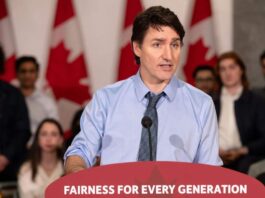
Provinces are likely to introduce mandatory vaccination policies in the coming months to deal with surging COVID-19 caseloads, Health Minister Jean-Yves Duclos said today.
“What we see now is that our health care system in Canada is fragile, our people are tired, and the only way that we know to get through COVID-19, this variant and any future variant, is through vaccination,” Duclos said.
Duclos said that while rapid tests, masking and social distancing are useful tools, they won’t end the pandemic on their own.
“Fifty per cent of hospitalizations now, in Quebec, are due to people not having been vaccinated,” he said. “That’s a burden on health care workers, a burden on society which is very difficult to bear and for many people difficult to understand.
“That’s why I’m signaling this is a conversation which I believe provinces and territories, in support with the federal government, will want to have over the next weeks and months.”
Duclos said that while discussions about mandatory vaccination policies are not taking place now, he believes that, based on his “personal understanding of what we see internationally and domestically and in my conversations [with] health ministers over the last few weeks,” the discussion will start in the coming weeks or months.
He stressed that it’s up to the provinces to decide whether to implement mandatory vaccination policies.
Watch: Health minister predicts provinces will make vaccination mandatory ‘at some point’:
Health Minister Jean-Yves Duclos says he personally thinks that ‘at some point,’ vaccines will become mandatory across the country in order to get Canada out of the pandemic. 1:34
Duclos said the provinces are facing a perfect storm of record-setting case numbers, a shortage of health care workers and up to seven million eligible Canadians still unvaccinated.
“What we can do … is provide vaccines, tests, personal protective equipment,” he said. “We can provide tracing support, we can provide all sorts of other non-human resources types of assistance.”
Intergovernmental Affairs Minister Dominic LeBlanc said there are limits to what the federal government can do to ease shortages of health care staff.
“It’s no surprise that provincial and territorial governments have considerably more health human resources, for example, than would the government of Canada,” he said.
Quebec, Europe strengthen vaccine policies
Earlier this week, Quebec’s Health Minister Christian Dubé announced that Quebecers will need to show proof that they are fully vaccinated in order to enter government-run liquor and cannabis shops as of Jan. 18.
Dubé said half of the people with COVID-19 being admitted to ICUs in the province are unvaccinated and that the new restrictions are needed to slow down hospital admissions.
The minister also said the Quebec government will soon expand the use of the vaccination passport to other non-essential businesses, such as personal care services. That announcement is expected in the coming days.
“By limiting the places they can go, we’re limiting their contacts,” Dubé said, referring to the unvaccinated.
“If you don’t want to get vaccinated, stay home.”
A spokesperson for Quebec’s health minister said mandatory vaccination is not something the province is looking at yet.
In a social media post, Alberta Premier Jason Kenney said his government will not make vaccines mandatory.
Alberta’s Legislature removed the power of mandatory vaccination from the Public Health Act last year and will not revisit that decision, period.<br><br>While we strongly encourage those who are eligible to get vaccinated, it is ultimately a personal choice that individuals must make. <a href=”https://t.co/16DcwLqknp”>https://t.co/16DcwLqknp</a>
—@jkenney
Some European countries, such as Austria and Greece, have moved in that direction already as infection rates hit record highs and vaccination campaigns stall.
Greeks over the age of 60 who are not yet vaccinated are now subject to monthly fines of 100 euros ($140 Cdn). Austria, which has one of the lowest vaccination rates in the European Union, is looking at fining unvaccinated Austrians more than 7,000 euros ($9,880). Slovakia, meanwhile, is offering payments of 600 euros ($844) to encourage people to get their shots.
There are signs that enforcing these new vaccine rules will be a challenge. In late November, roughly 40,000 people assembled in Vienna to protest the new rules.

Dr. Theresa Tam, Canada’s chief public health officer, said the national average daily case count has increased by 65 per cent since the previous week, with a daily average of 42,000 new cases being reported.
Tam said that about 29 per cent of laboratory tests are coming back positive, indicating significant community transmission of the virus.
She said non-ICU hospitalizations increased 91 per cent over the previous week, while ICU admissions went up by 25 per cent.
“Although evidence from ongoing surveillance and recent studies indicates that the risk of hospitalization is lower for Omicron compared to Delta, the sudden acceleration of Omicron and enormous volume of cases is driving severe illness trends,” she said.
Duclos said that while the current surge in hospitalizations is hitting Quebec and Ontario the hardest, other provinces should prepare for the same.
“These provinces and territories must know and must act on the basis of what they see with other provinces like Quebec and Ontario,” he said.
“That’s also a warning, a kind warning, but a clear warning, to some provinces and territories that they need to act now. Because if they don’t act sufficiently it’s going to be difficult for the federal government to help after, because we don’t have the capacity to do so.”













